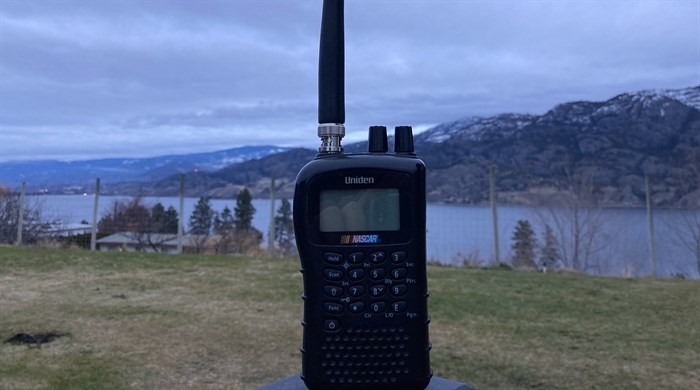
Okanagan residents who get their weather forecast from a weatheradio or scanner heard a tsunami alert on the Penticton and Kelowna channels earlier this week. Environment Canada is currently looking at the possibility of decommissioning weatheradio transmitters in Kelowna and Kamloops.
(STEVE ARSTAD / iNFOnews.ca)
January 08, 2021 - 6:30 AM
Okanagan residents used to following the weather on the area’s weatheradio station received a very unusual warning Tuesday morning.
The station, which operates on a VHF frequency of 162.475 in Penticton and at 162.55 out of Kelowna, was broadcasting the day’s weather in French on Jan. 5, following which residents were issued a tsunami warning.
“A tsunami alert has been issued for locations in your area. Stay tuned for further information,” is what listeners heard prior to the English version of the forecast.
The broadcast, which can be received on scanners and on weatheradio receivers, repeated for several hours.
Needless to say, Okanagan residents had less to worry about from an inundation of sea water than they did from a real weather forecast calling for high winds and some rain Tuesday afternoon.
Environment Canada meteorologist Armel Castellan said in an email today, Jan. 7, the weather agency has investigated the high water warning heard on the Penticton and Kelowna transmitter.
He says the tsunami alert was the result of a corrupted configuration file that caused the message, which is pre-recorded, to be inserted into the regular program cycle.
Weatheradio Canada is made up of a network of transmitters across the country, providing continuous updates of weather information. The service is operated by Environment Canada’s meteorological service.
The system provides continuous (24 hour) broadcasts of weather information and instant updates when bad weather threatens. The system is evolving into an ‘all hazards’ alert system and in some locations a low power broadcast is transmitted on regular FM and AM radio, allowing reception on an ordinary radio.
Yesterday’s tsunami warning occurred as Environment and Climate Change Canada looks at the possibility of decommissioning 48 of the country’s 230 transmitters.
The Kelowna and Kamloops transmitters are included in the list for decommissioning.
The Kelowna transmitter serves Penticton, Summerland, Lake Country, Vernon, Peachland, Kelowna, Lumby and Douglas Lake.
The Kamloops transmitter serves Chase, Sun Peaks, Logan Lake, Savona, Kamloops, Barriere, Ashcroft Cache Creek and Pinatan Lake.
The transmitters identified for possible decommissioning are mostly situated in areas where they provide overlapping service and where alternate access channels such as cell phone, Coast Guard VHF marine radio and internet accessibility is available as an alternate source of weather information and alerts.
Castellan said Environment and Climate Change Canada has received and analyzed feedback from weatheradio users.
“Further consultation will be conducted within the next few months to obtain a more complete picture of the extent of weatheradio usage in regions where concerns about decommissioning were raised. ECCC will not proceed with decommissioning prior to a full investigation of user dependencies,” Castellan said.
To contact a reporter for this story, email Steve Arstad or call 250-488-3065 or email the editor. You can also submit photos, videos or news tips to tips@infonews.ca and be entered to win a monthly prize draw.
We welcome your comments and opinions on our stories but play nice. We won't censor or delete comments unless they contain off-topic statements or links, unnecessary vulgarity, false facts, spam or obviously fake profiles. If you have any concerns about what you see in comments, email the editor in the link above.
News from © iNFOnews, 2021